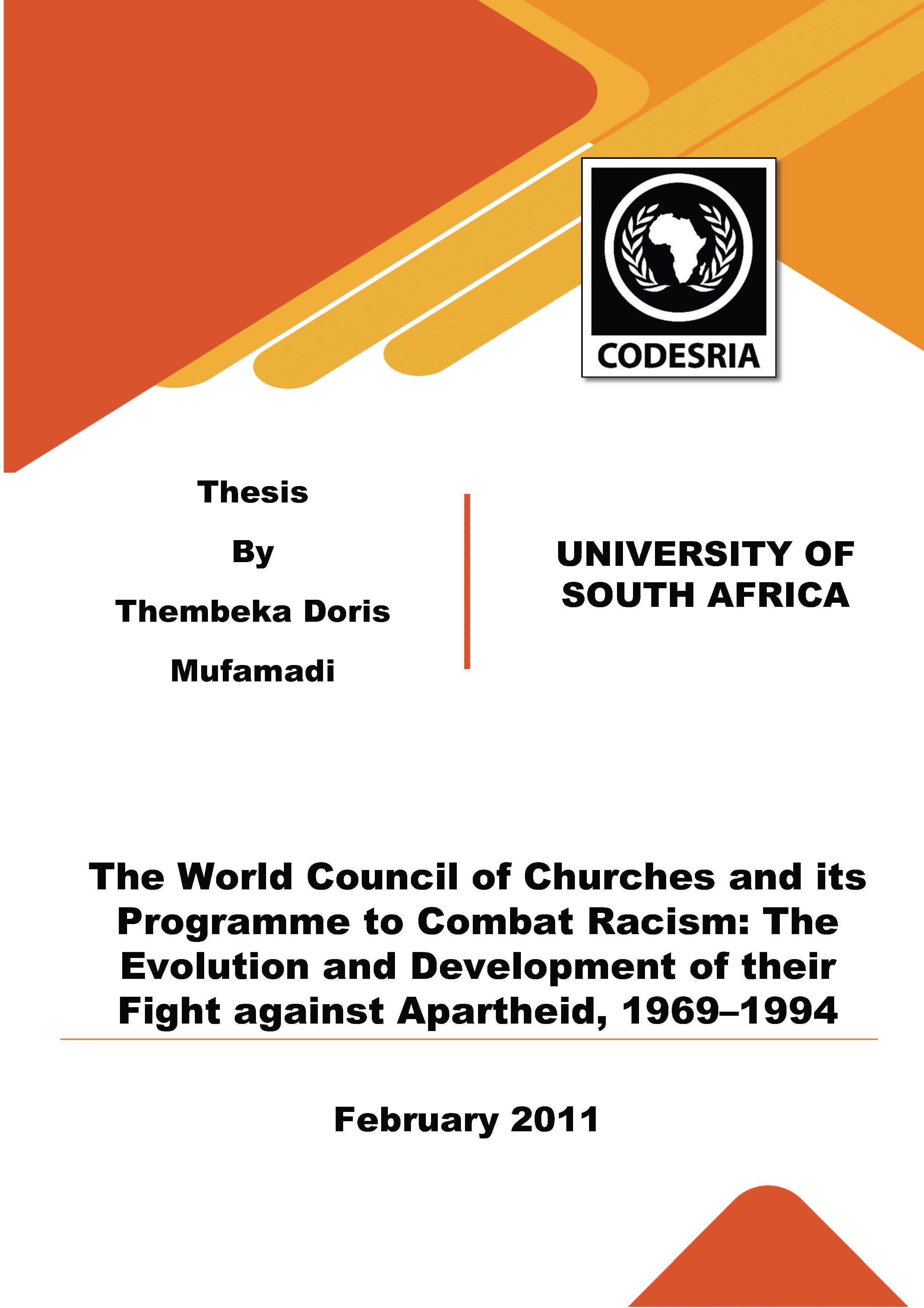The World Council of Churches and its Programme to Combat Racism: The Evolution and Development of their Fight against Apartheid, 1969–1994
Mots-clés :
World Council of Churches, Programme to Combat Racism, liberation movements, apartheid, African National Congress, Pan Africanist Congress, South African Congress of Trade Unions, religious radicalism, white supremacy, South African historySynopsis
This historical study explores the development of the World Council of Churches’ (WCC) Programme to Combat Racism (PCR), 1969–1994, and its campaign against apartheid in South Africa. It demonstrates how church-state relations can be understood as ‘resistance’, but takes the analysis further by arguing that the PCR, as an external transnational, ecumenical lobby with intimate links to South African political radicalism, as well as exiled militant formations among the liberation movements, sanctified revolutionary action in dealing with white supremacy. It succeeded in marshalling a broad range of international opinion by creating an agency dedicated to the eradication of racism within the structures of the WCC. Increasingly diverse membership enabled it to act decisively outside the constraints of pre-eminent Western interests, theology and diplomacy, drawing more directly on strands of Liberation Theology and the politics of non-alignment.
The thesis, based on extensive archival research in Geneva and South Africa, covers the growing activism of the PCR in the 1970s and 1980s, tracing its aims, projects and achievements under the various WCC general Assemblies at Uppsala, Nairobi, Vancouver and Canberra between 1968 and 1991. The PCR applied multiple strategies to attack apartheid, including special funding to the African National Congress, Pan Africanist Congress and South African Congress of Trade Unions, action research and anti-racism programmes to inform and influence churches in different parts of the world to join the antiapartheid struggle.
The WCC and PCR provided a space for debate across a range of ideological contestation. This was a function of its location in Geneva, its broad ecumenism and its openness to representing the interests of oppressed communities. Its attraction to political action, civil society lobbies and philanthropic enterprises contributed to its effectiveness as a ‘think tank’ for liberation, distinct from defined party-political forums or secular international human rights agencies. It therefore represented a ‘clearing house’ for ideas about democratic transformation and social change. Even though the PCR drew fire for its support of armed struggle, it succeeded in fostering dialogue among liberals and radicals, opposing political factions and competing international interests in rethinking South Africa’s future between 1969 and 1994.
Téléchargements
Références
Ally, T.R., ‘The Bank of England and South Africa’s Gold, c. 1886–1926’ (PhD thesis, Cambridge University, 1990).
Caplan, M., ‘Coercion and Dissent: Case Studies in McCarthyism in the USA’ (MA dissertation, UNISA, 2006).
Chikane, F.A., ‘A Critical Examination of the Theology and Praxis of the SACC, 1968–1988’ (MA dissertation, University of Natal, 1992).
Coker, C., ‘Constructive Engagement: The United States, Southern Africa and the Use of Positive Sanctions (1969–1974)’ (PhD thesis, Wolfson College, 1982).
Fowlkes, D.W., ‘Developing a Church Planting Movement in India’ (PhD thesis, Free State University, 2005).
Gous, A.G.S., ‘Die Ekumeniese Verhouding tussen die Nederduitse Gereformeerde Kerk en die Wereldraad van Kerke vanaf 1948–1994’ (PhD thesis, Pretoria University 1995).
Grundlingh, L.W.F., ‘The Participation of South African Blacks in the Second World War’ (PhD thesis, Rand Afrikaans University, 1986).
Hasselblad, K.S., ‘The United States Foreign Policy on South Africa: Leon Sullivan and the Sullivan Principles, 1948–1980 (MA thesis, Pacific Lutheran University, 1994).
Hudson, D.K., ‘Religious Traditions as Civil Society Actors in South Africa, 1910–2000’ (PhD thesis, University of Denver, 2004).
Kaplan, D.E., ‘Class Conflict, Capital Accumulation and the State: A Historical Analysis of the State in Twentieth-Century South Africa (PhD thesis, University of Sussex,1977).
Kritzinger, J.N.J., ‘Black Theology: Challenge to Mission’ (DD thesis, UNISA, 1988).
Luckhoff, A.G., ‘Die Cottesloe-Kerkberaad’ (PhD thesis, University of the Witwatersrand,1975).
Maimela, M.R., ‘Black Consciousness and White Liberals in South Africa’ (PhD thesis, UNISA, Pretoria, 1999).
Massie, R.K., ‘Moral Deliberation and Policy Formulation: A Study of Eight Institutional Investors’ Approaches to South Africa’ (PhD thesis, Harvard University, 1989).
Naude, R.M., ‘The Ethics of the “Oikumene” with Special Reference to the South African Council of Churches’ (PhD thesis, Pretoria University, 1983).
Phillips, F.D., ‘Richard Ambrose Reeves: Bishop of Johannesburg, 1949–1961’ (MA dissertation, UNISA, 1995).
Ryan, C.G., ‘From Acquiesce to Dissent: Beyers Naudé’ (MA dissertation, UNISA,1997).
Steenkamp, J.J., ‘The Wereldraad van Kerke se Bemoeienis met die Rassevraagstuk in Suid-Afrika: ’n Histories-Analitiese Oorsig van die Periode 1950–1970’ (PhD thesis, Pretoria University, 1988).
Van Tonder, D.P., ‘Sophiatown Removal and Protest, 1940–1955’ (MA dissertation, UNISA, 1990).
Warr, K., ‘The Normative Promise of Global Civil Society: The Role of the World Council of Churches in the Transition to and Maintenance of Democracy in South Africa’ (PhD thesis, American University, 1998).






